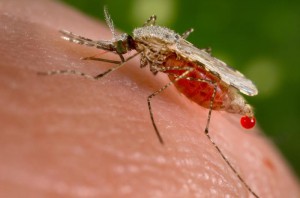Podcast: Play in new window
BOB HIRSHON (host):
The key to malaria’s free ride. I’m Bob Hirshon and this is Science Update.
The malaria parasite relies on mosquitoes to carry it. Which means it needs to hide from the mosquito’s immune system. Now, National Institutes of Health biochemist Carolina Barillas-Mury and her colleagues have found a crucial gene involved. It makes a protein called Pfs47, which keeps the mosquito’s immune system from detecting the parasite.
CAROLINA BARILLAS-MURY (National Institutes of Health):
And what we found is that the alarm system that tells the mosquito that an infection has happened, that information doesn’t get through. And so the mosquito allows the parasite to infect without putting any resistance.
HIRSHON:
She says the gene comes in several varieties, each of which makes a different protein that works on a particular type of mosquito. If this protein could be disrupted – for instance, by introducing an antibody into the mosquito population – it could make malaria much harder to spread to humans. I’m Bob Hirshon for AAAS, the Science Society.

